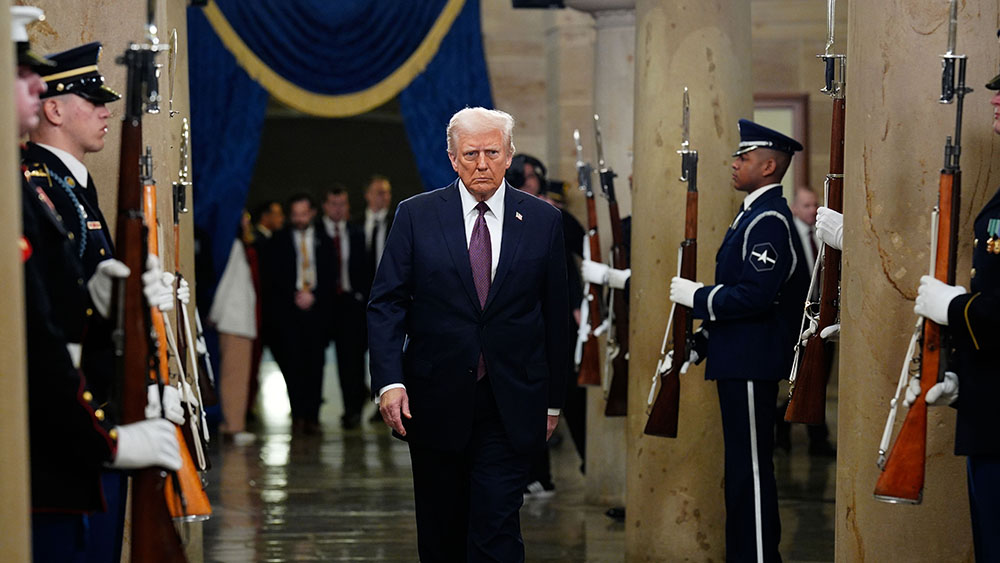Federal court strikes down warrantless FISA backdoor searches as unconstitutional
By isabelle // 2025-01-27
Tweet
Share
Copy

- A federal judge ruled that the U.S. government’s warrantless “backdoor searches” under Section 702 of FISA are unconstitutional, marking a major victory for privacy rights.
- The case involved Agron Hasbajrami, whose communications were collected without a warrant under Section 702, which targets non-U.S. persons abroad but often sweeps up Americans’ data.
- Judge LaShann DeArcy Hall emphasized that warrantless searches of U.S. persons’ data violate the Fourth Amendment, curbing unchecked government surveillance.
- Section 702, set to expire in 2026, faces renewed scrutiny, with privacy advocates pushing for reforms like warrant requirements and increased transparency.
- While Hasbajrami’s conviction stands, the ruling sets a precedent to limit government overreach and reaffirms constitutional protections against unreasonable searches.
A long overdue check on government overreach
Section 702, enacted as part of the FISA Amendments Act of 2008, has long been a contentious tool in the government’s surveillance arsenal. It permits intelligence agencies to collect communications of non-U.S. persons reasonably believed to be outside the country. However, the program has been criticized for its “incidental” collection of Americans’ communications and the FBI’s routine use of backdoor searches to access this data without a warrant. In Hasbajrami’s case, the government initially targeted a foreign individual but mistakenly collected his communications, later querying the database without a warrant. While the Second Circuit Court of Appeals upheld the initial collection as lawful in 2019, it remanded the case to Judge Hall to determine whether the subsequent searches violated the Fourth Amendment. Hall’s ruling confirms what privacy advocates have argued for years: warrantless backdoor searches are unconstitutional. “This is a major constitutional ruling on one of the most abused provisions of FISA,” said Patrick Toomey, deputy director of the ACLU’s National Security Project. The ruling comes as Section 702 is set to expire on April 15, 2026, and reignites the debate over its reauthorization. Privacy advocates are urging Congress to implement reforms, including a warrant requirement for querying U.S. persons’ data and increased transparency. Despite the court’s decision, Hasbajrami’s conviction stands, as Judge Hall denied his motion to suppress the evidence on separate grounds. However, the ruling sets a precedent that could curb the government’s unchecked surveillance powers.A victory for privacy, but the fight continues
Judge Hall’s decision is a resounding affirmation of the Fourth Amendment’s protections against unreasonable searches and seizures. It also highlights the need for greater oversight and accountability in how the government uses Section 702. While the ruling is a win for privacy advocates, the battle is far from over. With Section 702’s expiration looming, Congress faces a critical choice: will it uphold the Constitution and rein in warrantless surveillance, or will it continue to enable the erosion of Americans’ privacy rights? For now, the court’s decision serves as a powerful reminder that no one — not even the government — is above the law. Sources for this article include: TheEpochTimes.com EFF.org Cato.orgTweet
Share
Copy
Tagged Under:
privacy police state surveillance Fourth Amendment freedom fisa unconstitutional privacy watch liberty Foreign Intelligence Surveillance Act warrantless search backdoor searches Section 702 watched unreasonable search LaShann DeArcy Hall
You Might Also Like
Trump takes on Bank of America: Holding corporate giants accountable for conservative exclusion
By Willow Tohi // Share
California proposes ballot initiative to secede, sparking debate on state independence
By Belle Carter // Share
EU pushing through with enforcement of censorship tool Digital Services Act
By Ava Grace // Share
Canadian “Anti-MAGA” hat bearing the slogan “Canada Is Not For Sale” goes viral
By Arsenio Toledo // Share
THE RISE OF TECHNOCRACY: How Silicon Valley’s vision threatens the American dream
By Willow Tohi // Share
Recent News
Seven New Yorkers charged in $44 million COVID tax credit fraud scheme
By isabelle // Share
Trump warns: China's DeepSeek AI breakthrough a wake-up call for U.S. tech
By isabelle // Share











